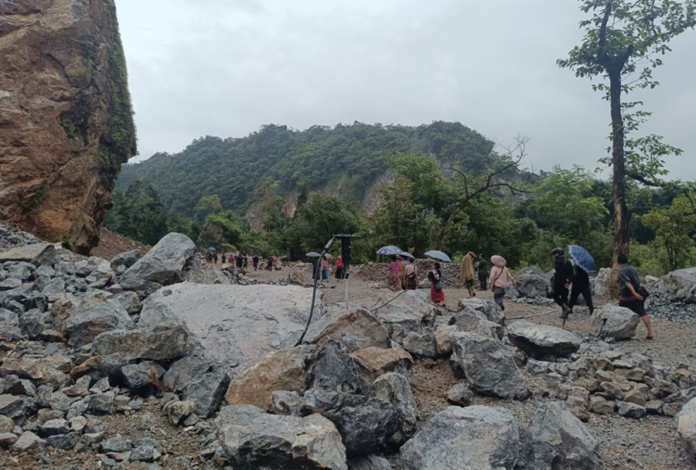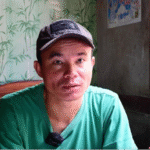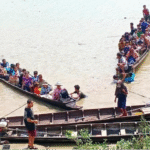An interview with an official from Paingkyon Township under control of the Karen National Union (KNU) whether the ongoing stone mining activities, which are adversely affecting the residents of Paung village, will be permitted to continue.
The stone mining operations supervised by Major Win Hlaing Sein from the Border Guard Force (BGF) Battalion-1015 in the Paung village area of Paingkyon Township, located within the KNU’s Brigade-7 territory in Hpa-An District, have caused significant damage to the farms and workplaces of local residents.
In addition, local residents submitted an objection letter to the district chairperson, citing security concerns over mining workers entering and occupying their farms, leading to theft of property. On 21 September, township officials carried out field inspections in response to these issues.
Despite ongoing concerns, the stone mining site has not yet been fully shut down, and local residents report facing health issues related to the gravel extraction. On 15 October, a meeting was held with officials from Hpa-An District and Paingkyon Township to discuss whether the KNU will permit gravel mining to continue. The KIC interviewed a KNU official from Paingkyon Township regarding the decisions reached during this meeting.
Q: On 15 October, a meeting regarding gravel production in Paingkyon Township was conducted by some leaders from the Border Guard Force (BGF). Who led this meeting?
A: This meeting was held under the directive of the district official. It was held in Paung village near the mountain. Locals agreed to this meeting. Many people attended the meeting. The attendees to the meeting are locals, township officials, the commander of Battalion-19, some members of BGF members and the Peace Council (PC).
Q: What decisions were made during the meeting regarding gravel production in Paingkyon Township?
A: During the meeting, approval was granted for two of the five sites proposed by locals for gravel production. The remaining two sites were found to be damaging to local farmlands. A decision has been made to implement a complete ban on gravel production in the area. However, due to ongoing operations and the presence of stone fragments on local farms, they are allowed to collect and grind these fragments again. The opportunity to continue work at the remaining site was also given, as it is not located near the areas where locals work. The three sites that will remain operational are expected to be completed by the end of May 2025 under a new contract.
Q: Currently, it is understood that the site affecting farmland due to gravel production has been temporarily halted. What plans are in place for its management in the future?
A: Currently, the designated rule states that when locals are farming, gravel mining operations must pause, and vice versa. For example, locals stop their work from 12 to 1 PM, allowing gravel miners to operate during that time. The mining site can resume work when locals return home between 5 PM and 6:30 PM. However, this arrangement is temporary. As mentioned earlier, it is meant to facilitate the ongoing work of clearing stones that have fallen in the fields. Once this cleanup is completed, there will be no further need to continue operations.
Q: Is there a plan to compensate for the damage to local farmland caused by the gravel production? Was this issue addressed during the meeting?
A: The gravel mining companies will provide compensation for the damaged farmland. However, locals have stated that they will not accept this compensation. Instead, the focus will be on clearing the damaged farmland and removing the small gravel stones from it.
Q: Given the issues of squatting and theft by workers from the gravel mining, the environment has become less safe. What measures will you take to address this situation?
A: The people in charge of gravel production said that in the past, some workers entered local lands and stole property. They have compiled an exact list of names of those who come to work, and it will be shared with local authorities. Some people are not affiliated with the company, and these actions are unrelated to the company’s operations. To address this, the existing list of workers will be cross-checked against squatters. The company plans to take responsibility for its workers and will take steps to remove anyone who does not belong to the company.
Q: Another thing is that due to the gravel mining, there are health problems for the local people. Was this issue discussed at the meeting? Is the district aware of the health problems faced by local residents?
A: Some local residents are experiencing skin diseases, and gravel stones have contaminated farmland and water sources. Locals have reported that they have to bathe in these affected waters, and those who fish or gather animals are suffering from poisoning as a result. Residents noted that these conditions have not been fatal. Another thing is that when stones fall into the water, it causes blockages that disrupt the water flow, affecting the supply for local farmers. The contaminated water is a major contributor to the skin diseases experienced by residents. Some of the people with skin disease and the elderly feel dizzy and tired when they inhale the toxic fumes from the mining site. However, not all locals are affected. It is challenging to determine the exact origin of those impacted, as it is not only residents of the nearby village who may be affected, but also individuals who come to fish in the area.
Q: Is there anything else you would like to add?
A: After this meeting, we will have to report back to the district officials. When some of the Karen ethnic armed groups work with companies, there were demands from the area officials in the meeting. Their demand is they need more time as they are still working for the road project. We also decided to give them another chance in order to solve the problem smoothly. In doing so, the current contract is set to last only until May 2025. Once it expires, we will need to reassess whether the road project is completed or if additional time is required. Even if we continue operations after May 2025, we will need to consult to ensure that the process remains systematic and does not cause further harm.
Sent by KIC



